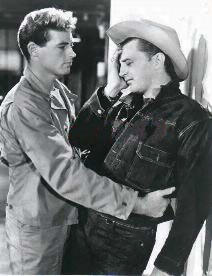The Man Behind the Curtain
 When Robert Mitchum blew into Italy to film part of the mini-series Winds of War he was 64 years old. That didn't stop Anna, the Austrian wardrobe girl from falling in love with him. For all the good it did they ended up in bed according to Anna but Mitchum was unable to perform. Her English gay male counterpart in the wardrobe department declared that Anna's aim was off: the reason Bob couldn't perform was that he much more preferred boys.
When Robert Mitchum blew into Italy to film part of the mini-series Winds of War he was 64 years old. That didn't stop Anna, the Austrian wardrobe girl from falling in love with him. For all the good it did they ended up in bed according to Anna but Mitchum was unable to perform. Her English gay male counterpart in the wardrobe department declared that Anna's aim was off: the reason Bob couldn't perform was that he much more preferred boys.It wasn't too long afterwards at the Hotel Lido in Venice when Mitchum was noticed blowing kisses across the bar. He was almost unrecognizable at that point given his state, but it was most assuredly Mr. Mitchum as another member of the cast pointed out and eventually introductions were made. The display that ensued after that encounter did nothing but reinforce the notion that Bob did definitely prefer the company of men. It was especially funny later on while he made drunken faces and gestures behind his wife's love seat over which he eventually fell face forward. Mrs. Mitchum encouraged her husband to go to bed which he did but not without letting the two males in the group know what was expected of them, of course, all the while behind his wife's back.
Mitchum simply enhanced his bad boy reputation by adding a different hue to it. A very different hue.
In her autobiography Shirley MacLaine describes an aspect of her affair with Mitchum in that there was a wall she could not get beyond. Seeing Mitchum in that atmosphere and getting to know him as he threw caution to the wind indicates just what was behind that wall Shirley couldn't knock down.
Robert Hofler's book about Henry Willson, The Man Who Invented Rock Hudson, is a very interesting and revealing read, which is the reason a review has been posted in the Critiques section of the main site. Of the many scandals recounted in those tales of Hollywoodland in the 50s one has to do with Mitchum's arrest for smoking marijuana. The arrest only seemed to make him more popular. His response: “Booze, broads, it’s all true … Make up more if you want." The second part of that statement is the more revealing. Talk about enhancing a reputation!

Of all the scrambling and hiding of the truth in that era or in any era for that matter, it seems that the departed Robert Mitchum knew exactly what to do to create an image -- and one that didn't die with him.

Comments